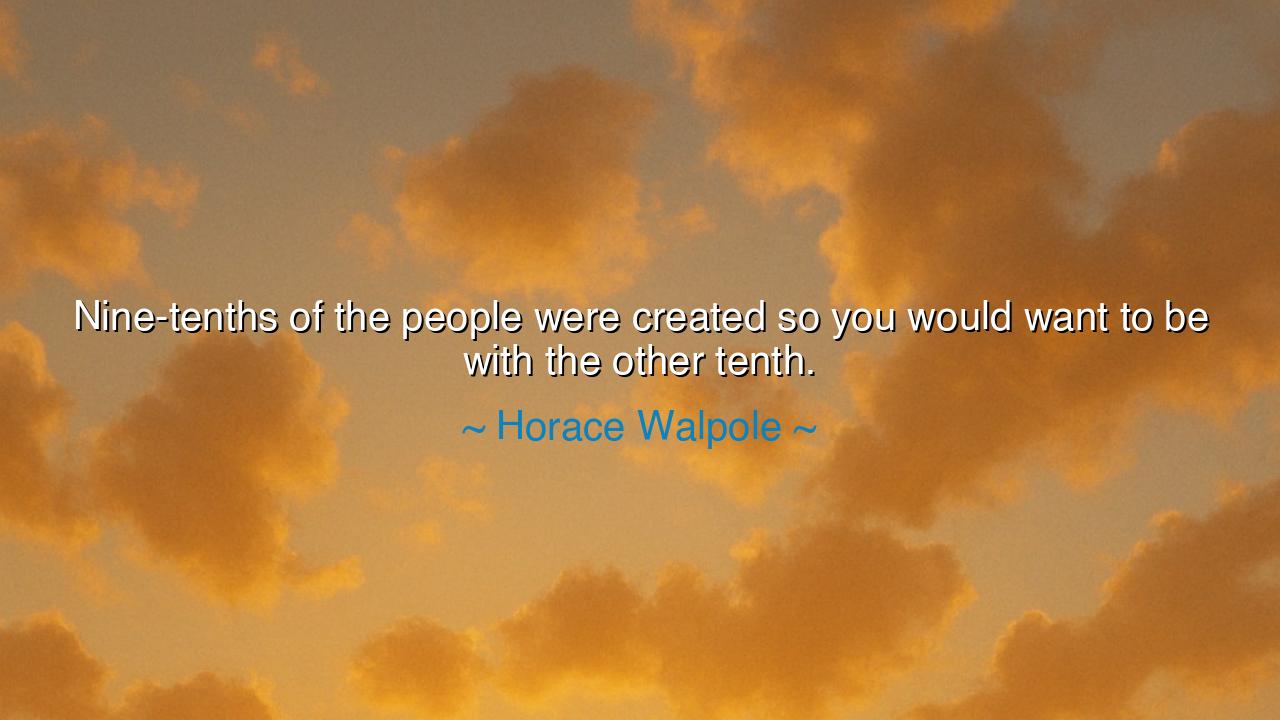
Nine-tenths of the people were created so you would want to be






In the vast expanse of the human experience, society is filled with many types of individuals—each with their own qualities, strengths, and flaws. In the writings of Horace Walpole, we encounter a piercing reflection on the nature of human relationships and the structure of society: “Nine-tenths of the people were created so you would want to be with the other tenth.” These words, though spoken in humor, carry with them a profound truth about the human condition. For Walpole’s wisdom suggests that the very fabric of human life is, in part, woven from the contrast between the mediocre and the extraordinary.
At the heart of Walpole’s words lies a deep observation about the nature of human relationships and the value of distinction. What makes someone truly desirable or compelling is not always the inherent qualities they possess, but often the contrast between their virtue and the lesser qualities that surround them. In this view, the mundane, the ordinary, and even the flawed serve a purpose in helping us recognize the exceptional. The common folk, whose qualities may seem unremarkable or even irksome, make the tenth of society—the brilliant, the exceptional, and the remarkable—stand out in stark contrast. Without this contrast, how could we appreciate greatness?
Consider the ancient world, where emperors, philosophers, and generals often found themselves surrounded by courtiers and advisors, many of whom were not of great intellect or merit but were necessary to highlight the power of their leaders. Alexander the Great, for example, did not rise to fame in a vacuum. His visionary leadership and his military brilliance were tested and amplified by the ordinary soldiers who followed him, many of whom lacked his strategic foresight but played their roles in the larger story. The distinction between Alexander’s brilliance and the common soldier’s obedience gave the world a clearer picture of greatness—making it possible for humanity to see what it meant to lead, to inspire, and to conquer.
In medieval Europe, the courts of kings and noblemen were filled with the common, the unremarkable, and the mundane, whose service was necessary not just to support the work of the ruler, but to highlight the importance of the noble class itself. The king, dressed in gold and surrounded by the humble servants, shone ever more brightly against the backdrop of poverty and struggle. The distinction between the wealthy and the poor was not merely a result of material wealth but was carefully cultivated by society to emphasize status, power, and prestige.
In more recent history, we see this same principle reflected in the realm of art and culture. The works of great artists like Leonardo da Vinci or Michelangelo became all the more extraordinary because they stood in contrast to the lesser works of their time. The flawed art of the masses made the masterpieces appear to be born of genius, and in doing so, they elevated the importance of the individual artist. These individuals, in their brilliance, stood as living monuments to the heights of human potential, with their excellence shining all the brighter against the ordinary work of their peers.
The lesson from Walpole’s reflection is clear: contrast is a powerful teacher. In the same way that we often appreciate light more after experiencing darkness, we come to understand the value of the exceptional by being surrounded by the ordinary. Our experiences with the common teach us the significance of the uncommon, just as the ordinary people in a society shape our understanding of the extraordinary men and women who stand out. But there is more: excellence is not just a reaction to the mediocrity around us; it is a call to rise above, to inspire, and to live in a way that will make the ordinary seek the extraordinary.
So, let us embrace our role in the greater picture of society—whether we are the exceptional tenth or the other nine-tenths. Each has its purpose, each its place. But we must also remember that the challenge of life is not to simply be content with the ordinary, but to strive for the extraordinary, to make our lives not just a contrast to those around us, but a shining example for others to emulate. In doing so, we fulfill our purpose, and in contrast to the mediocrity that surrounds us, we can leave behind a legacy of greatness, inspiration, and virtue.






AAdministratorAdministrator
Welcome, honored guests. Please leave a comment, we will respond soon